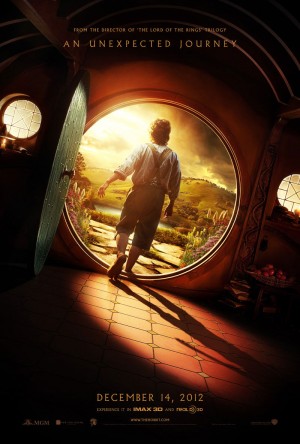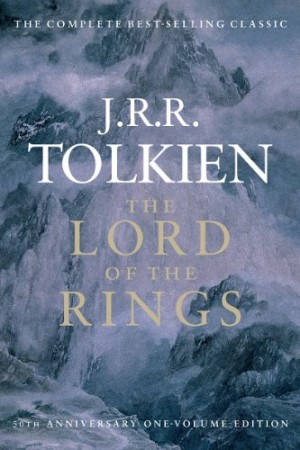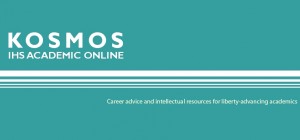

A director returns, after several years and more than one lackluster attempt with other kinds of movies, to a genre he redefined. He had some little known but modestly successful works before his big breakthrough, but since then he just has not been the same man who gave us such an epic, fantastic spectacle full of industry-defining special effects, wonderful music, thrilling action, and, above all, a new world to explore with characters we wanted to accompany. Special effects have come a ways since his magnum opus was crafted, and if used correctly they have the potential to enhance the visual experience even more than before. What could possibly go wrong?
Peter Jackson’s latest project is out in theaters. I wish I could say it was called The Hobbit, but honesty compels me to report that the name is actually The Hobbit: An Unexpected Journey. The reason for the alteration is that The Hobbit will be brought to us not as a short adventure thrill ride, in keeping with the pace and feel of the source material, but rather will be extended into a movie trilogy that, when finished, will outlast a typical BBC miniseries. The motive behind this sort of reverse editing, whereby Tolkien’s notes were raided for things to stuff into the story and plump it up, is Mr. Jackson’s belief that we are stupid enough to triple his box office take if he triples the number of movies to be made from the story. He is probably right. I know I bought my ticket.
Even with his triumphs Jackson had a tendency to let a project get bloated. The best example, I believe, is the sudden barrage of scenes that hit us in The Two Towers right as we should be, could be, would be cruising toward the third act if a drawn-out and apocryphal love story were not fed to us by way of flashbacks, many in a languid, dreamy style that makes one wonder if one has just witnessed something shot wholly in slow motion. When Jackson had over 1,000 pages of material to convert to nine hours of footage this was an annoyance. With The Hobbit, he has fewer than 300 pages to make into nine hours and the filler has now surpassed the beef in the hotdog.
[continue reading…]
Help Promote Prometheus Unbound by Sharing this Post

In this episode of the Libertarian Tradition podcast series, part of the Mises Institute’s online media library, Jeff Riggenbach makes the case that the author of The Lord of the Rings, J.R.R. Tolkien, can be counted as a libertarian.
Editor’s Note: A transcript is unavailable. This early episode was never turned into a Mises Daily article like most of the others.
Here is a brief summary, however:
Riggenbach argues that The Lord of the Rings is “both an allegory of the inevitable fate that waits for all attempts to defeat evil power by power and an allegory of power exerted for domination.” The story is a dramatization of Lord Acton’s famous dictum that “power tends to corrupt, and absolute power corrupts absolutely.”
After a delving deeper into Lord Acton and his dictum, Riggenbach reads a couple of passages from one of Tolkien’s letters to his son, Christopher, that were also quoted by Alberto Mingardi and Carlo Stagnaro in their Mises Daily article, “Tolkien v. Power” (February 21, 2002). I quote the passages below for your convenience, but the whole article is well worth reading:
[continue reading…]
Help Promote Prometheus Unbound by Sharing this Post

 The Institute for Humane Studies, through its academic social network Kosmos Online, has an irregular podcast series on science fiction and liberty of the “Themes of Liberty in (insert favorite sci fi tv show/book/game here)” variety.
The Institute for Humane Studies, through its academic social network Kosmos Online, has an irregular podcast series on science fiction and liberty of the “Themes of Liberty in (insert favorite sci fi tv show/book/game here)” variety.
Here’s a list of the episodes so far:
Help Promote Prometheus Unbound by Sharing this Post
Lots of news to catch up on with this post.
- Over a decade ago, a Russian paleontologist wrote an alternative take on the War of the Ring from J.R.R. Tolkien’s The Lord of the Rings. Recently translated into English, Kirill Yeskov’s The Last Ringbearer tells the tale from the point of view of Mordor, the bad guys in Tolkien’s epic.
History is usually written by the victors, but now the truth of the War of the Ring has finally come out. Gandalf is portrayed as a warmonger bent on destroying a bastion of civilization dedicated to reason, science, technology, and industrialization because science “destroys the harmony of the world and dries up the souls of men!” The elves are bent on world domination and Aragorn is a Machiavellian schemer whose strings are pulled by his wife, Arwen.
If you’re intrigued, you can learn more about The Last Ringbearer from the Salon.com article “Middle-Earth according to Mordor” and, also on Salon.com, the author’s own account of why he wrote the novel. You can download The Last Ringbearer for free and give it a read. Here’s to hoping Christopher Tolkien doesn’t aggress against Yeskov by launching a copyright or trademark infringement lawsuit.
- Finally, the print magazine, Analog Science Fiction and Fact, is entering the digital age and switching from snail mail to an electronic submissions system.
- In my previous news roundup, I posted the trailer of the upcoming movie adaptation of Ayn Rand’s Atlas Shrugged as well as some reports from people who had seen an advance preview and an interview with the producer. Here’s more footage, the scene in which Henry Rearden returns home and gives his wife a bracelet made from the first pouring of Rearden Metal:
[continue reading…]
Help Promote Prometheus Unbound by Sharing this Post
In a new addition to the Mises Institute’s online media library today, part of The Libertarian Tradition podcast series, Jeff Riggenbach discusses libertarian science fiction.
Riggenbach discusses the role of science fiction in keeping individualism alive, the phenomenon of all the best known libertarian novels being science fiction novels, Eric S. Raymond’s “A Political History of SF” in which Raymond argues that science fiction has a natural affinity with libertarianism, and the importance of dramatizing our values (pdf).
Reviewed in some detail are A.E. van Vogt’s novel The Weapon Shops of Isher and Eric Frank Russell’s novel The Great Explosion.
Transcript.
Help Promote Prometheus Unbound by Sharing this Post











